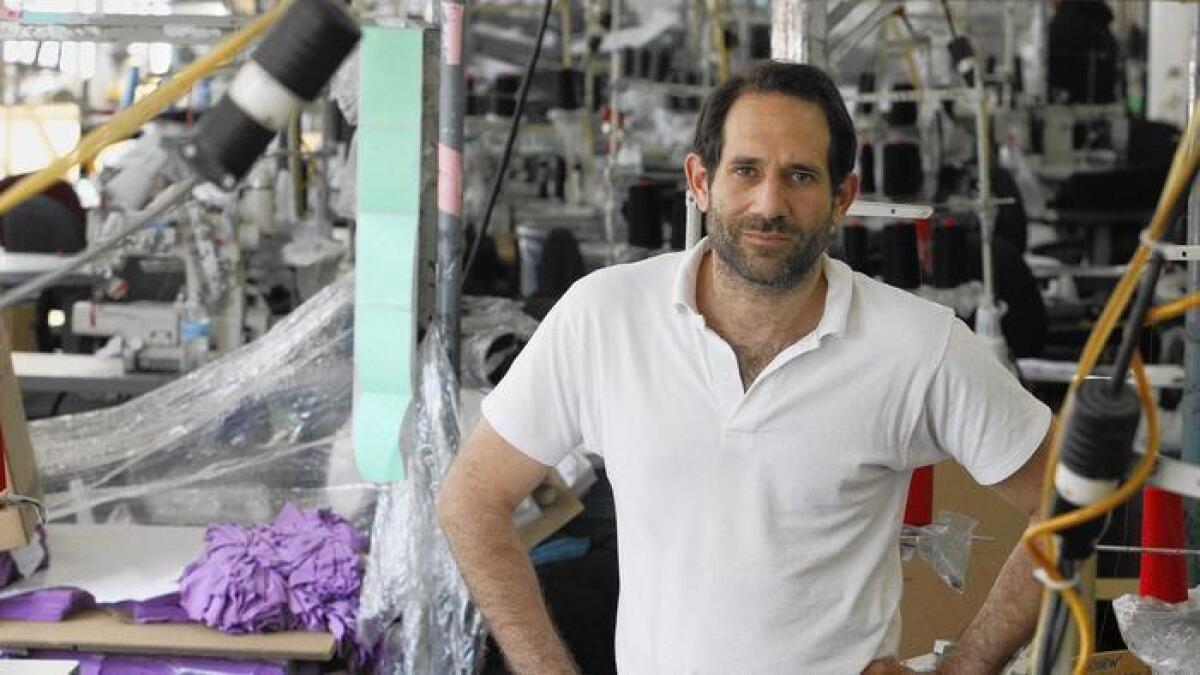American Apparel: Ousted CEO Dov Charney gears up for a power grab

Ousted American Apparel Chief Executive Dov Charney is firing up the machinery to retake control of the company that booted him nearly two weeks ago.
Charney plans to solicit the written consent from other stockholders to expand the number of board members to 15 from seven, elect new directors and amend company bylaws at a special shareholder meeting, according to a Tuesday filing with the Securities and Exchange Commission.
This is Charney’s first indication that he intends to wage a “proxy fight,” as it’s known in corporate circles, by soliciting the right to vote other stockholders’ shares in support of his position.
On Monday, Charney revealed that he had significantly upped his stake in the Los Angeles retailer to 43% from 27%. He spent $19.6 million to buy an additional 27.4 million shares last week, according to security filings.
Both American Apparel and Charney have engaged in a series of moves and countermoves since the board voted him out June 18.
Charney’s buying spree apparently came before American Apparel announced a shareholder rights plan on Saturday. The one-year poison pill plan is designed to keep Charney from regaining control of the retailer after he announced plans last week to buy more shares in the company.
It is unclear whether Charney, the company’s biggest shareholder, can call a special meeting of shareholders.
In his filing Tuesday, Charney states that the law in Delaware, where American Apparel is incorporated, allows him to take action to expand the board and install his own directors in the new positions without a special shareholders meeting if he is able to acquire the written consent of enough shareholders. Charney said he intends to seek such consent.
Over the weekend, a special committee of the board changed American Apparel’s bylaws. The amended bylaws now prohibit executives or shareholders from calling special meetings, roughly doubles the time required to nominate directors and submit stockholder proposals at annual meetings and emphasized that board directors can be removed only “for cause.” American Apparel said Monday that it had rejected Charney’s request last week for a stockholder meeting.
Regardless of the bylaws, analysts said that Charney’s huge block of shares may force the board to sit down with him. Charney now has the power to block any big moves that the company may try to make, including a sale to an interested buyer.
Charney bought his new shares on Friday after reaching a deal with New York investment firm Standard General. The cooperative buying arrangement stipulates that Standard General would buy American Apparel stock and then lend Charney the money to buy the stock from the firm at an annual interest rate of 10%, a security filing said.
Late Monday, Standard General reported to the SEC that last week it had bought 27.4 million shares, which it sold to Charney on Friday. It bought an additional 1.5 million shares on Monday.
The board voted to replace Charney as chairman and terminate him as CEO pending an investigation “into alleged misconduct.” The vote resulted in Charney’s immediate suspension, but under his employment contract, termination requires a 30-day delay.
The company has been working hard to counter attempts by Charney to get back his job. His lawyer, Patricia Glaser, filed an arbitration petition last week alleging wrongful termination, breach of contract and retaliation, among other issues.
Aside from its difficulties with Charney, American Apparel is struggling to overcome many hurdles.
The retailer has lost nearly $270 million in the last four years and is more than $200 million in debt. The company has warned that firing Charney could trigger defaults on nearly $40 million in loans and force it into bankruptcy.
One lender, Lion Capital, which owns 12% of American Apparel’s stock, has demanded repayment on a $10-million loan this week, according to the New York Post. That could trigger another default on a $30-million loan with Capital One.
Allan Mayer, the retailer’s co-chairman, said that the company had sufficient capital to pay off the loan if Lion asks to be repaid right away.
Follow Shan Li on Twitter @ShanLi
More to Read
Inside the business of entertainment
The Wide Shot brings you news, analysis and insights on everything from streaming wars to production — and what it all means for the future.
You may occasionally receive promotional content from the Los Angeles Times.











